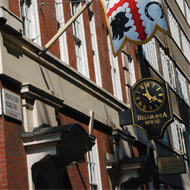
Size and composition of council to alter by 2021
The RCVS Council is set to shrink by almost half in the next three years, the college has confirmed, after changes to its governance structure were approved by both Houses of Parliament.
A legislative reform order (LRO) will amend the Veterinary Surgeons Act 1966, making key changes to the governing body.
Council will see a gradual reduction in the number of members, from the current 24 to 13, by 2021. As a result, only the first three candidates with the most votes in this year’s election will take up four-year terms on RCVS Day (13 July). These candidates are Susan Paterson, Mandisa Greene and Neil Smith, all of whom were re-elected.
Under the LRO, the composition of council will also alter to include six lay members and two veterinary nurses.
The number of members appointed by each recognised vet school will be reduced from two to one and Privy Council will no longer be required to appoint members. From 1 July 2020, veterinary schools will collectively appoint a total of three members to serve on council.
Members will no longer be able to serve more than three consecutive terms of office and, after serving three terms, they will not be eligible to stand again for two years.
Furthermore, the RCVS says council members may be removed from office if they fail to satisfy any conditions about fitness to be a member, which is determined by their peers on council. If removed from office, they cannot stand as a candidate again for two years.
Introducing the LRO before the House of Lords, Lord Gardiner of Kimble said the changes will “bring the RCVS in line with many other modern-day regulatory bodies and allow for greater efficiency, transparency and accountability to both members and the general public”.
RCVS president Stephen May said the college had been looking to reform council “as an issue of some urgency” since 2013 as it was “becoming unwieldy”, which had an impact on the cost of each meeting, as well as the frequency with which members could reasonably meet.
He added: “This reform has been long in gestation and so we are glad that this has now been approved and that we can look forward to a more modern, agile and efficient governance structure, aimed as always at benefitting the professions, animal owners and animal health and welfare.”
Image © RCVS



 The Veterinary Medicines Directorate (VMD) is inviting applications from veterinary students to attend a one-week extramural studies (EMS) placement in July 2026.
The Veterinary Medicines Directorate (VMD) is inviting applications from veterinary students to attend a one-week extramural studies (EMS) placement in July 2026.